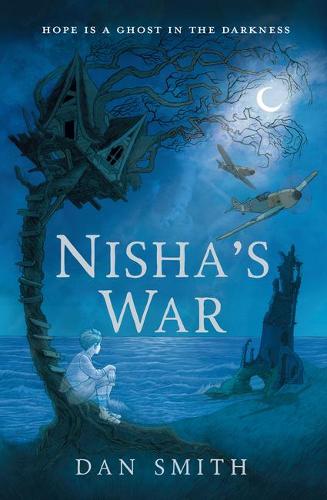Nisha’s War
Dan Smith (Chicken House)

Review by Halimah
I found the book interesting with the different scenes and plot twists. I liked Nisha because she never gave up. I learnt from Nisha that its best to never give up even when something is hard or uncomfortable. I found the book cool and interesting. I would definitely recommend the book since I love mystery and know other who do too.
Review by Leila
Nisha’s War is about a 13-year-old girl named Nisha living in 1942. She has just escaped the terror of the Japanese invasion of Malaya, and has come to live with her grandmother with her sick Amma (her mother). Her Papa unfortunately didn’t get onto the same ship they were on, and you see the struggle that many people in WW2 must have gone through about not knowing where somebody you cared for was and if they were alive or not. It talks about what it must have been like back then, when new refugees with mixed skin weren’t as accepted in society as they are now. It has very interesting concepts and the mysterious fantasy part of the book is extremely intriguing and hooks you into the book, whilst adding lots of historical aspects that makes it feel as if you are really experiencing it.
Furthermore, I really enjoyed the fact that the book included people’s accents in their speech through different word variations so their voices and characters are really shown through the fantastic writing. I really loved Nisha’s character, but I was curious to know more about Joy. At first, I found Mrs Barrow very annoying and mean, but as the story went on, I understood more about her and her past, which made me grow to like her just like Nina did. I also thoroughly enjoyed Elizabeth’s backstory and the big plot twist that came with it, which I didn’t expect at all and I’m sure other readers didn’t.
This is definitely a brilliant historical fiction book which I would recommend to many people aged 10-13 as I think they would enjoy the mix of historical and fantasy features.
Review by Maisie
Nisha’s war is about a half Indian, half British girl named Nisha. Due to the invasion of Malaya by the Japanese she moves to her father’s ancestry home in England. She is made to feel isolated with her different complexion compared to others and her own grandmother, Mrs Barrow. The story begins after Nisha and her mother arrive at the train station; Mr Foster takes them to their new home. Greeted coldly by Mrs Barrow and simply ignored by Mrs Foster. Amma begins to develop a cold in which scares Nisha. With both her father missing and her mother gravely ill, she has her first encounter with Twig, a supernatural being. Throughout the story, Nisha discovers signs such as ‘honestas’ which in Latin means hope, she begins to discover and gain confidence in herself and her new sudden home. Mrs Barrow experiences drastic character development as she finally realises how cold and distant, she has been to Nisha and her mother. It happens when Nisha and her grandmother are stuck in a wooden shack seeking refuge from the raging tides. She tells of her past and about how Nisha reminds her off her sadly passed daughter Elizabeth Barrow, Nisha’s auntie. Mrs Barrow explains Elizabeth’s unfortunate death after it being due to the fault of the weeping tree. Nisha’s war isn’t just about the events of WW2 but her own war, against her trauma, feelings and those who look down at her. A key figure in this story is Jamie, he is Nisha’s best friend and is seen to bring a comedic element in the midst of the trauma and PTSD Nisha faces especially towards the ocean and her fear of being taken by it like it had taken David Hill. Jamie ‘s first appearance was when he saved Nisha from choking on a lemon sweet, shortly after they become good friends. Jamie helped Nisha snatch the key for the secret room in which Mrs Barrow insisted it was to be kept locked and untouched. From my own personal experience with this book, it taught me a lot about overcoming fears and taught me an underrated horrific event in history overlooked and forgotten about. I would like to read more stories like this about small pieces of history and stories forgotten about.

